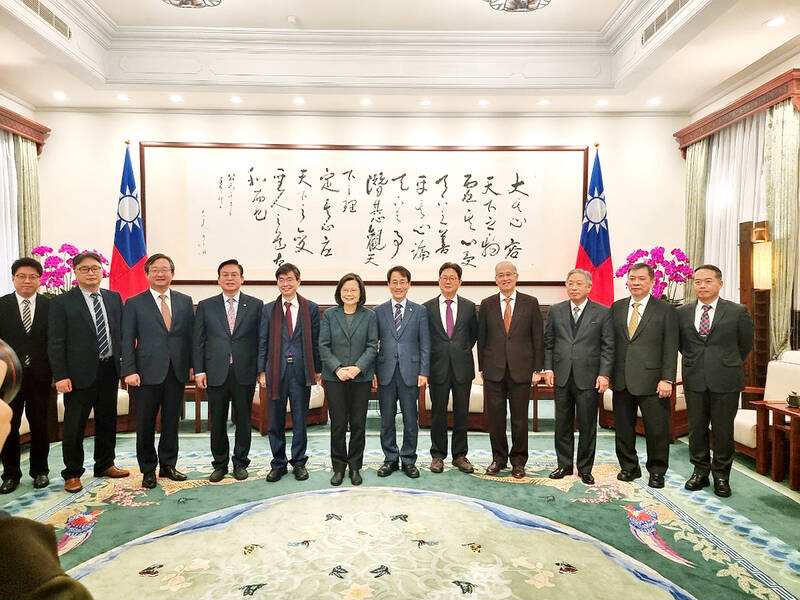The Ministry of Foreign Affairs yesterday criticized Beijing’s embassy in Seoul over “despicable” comments protesting a visit of a delegation to Taiwan last week led by South Korean National Assembly Deputy Speaker Chung Woo-taik.
In a post on WeChat, an embassy spokesperson said that the lawmakers’ visit contravenes the “one China” principle and harms the development of friendly relations between China and South Korea.
When referring to the visit, the spokesperson used the derogatory term cuan fang (竄訪), which equates the lawmakers to rats “scurrying” around. Beijing had used the term before when discussing then-US House of Representatives speaker Nancy Pelosi’s visit to Taiwan last year.

Photo from South Korean lawmaker Lee Dal-gon’s Facebook page
The spokesperson also said “Taiwan independence secessionist forces” and meddling by foreign forces were threatening stability in the Taiwan Strait.
Taiwan “solemnly censures” the Chinese ambassador in South Korea, who made comments that “seriously distorted facts and infringed on the dignity of South Korea and our country’s sovereignty,” the ministry said in a statement.
“China’s overturning of right and wrong, its uncouth language and its wolf warrior behavior can only be described as despicable,” the statement said.
Taipei’s reception of foreign guests, including major political figures and lawmakers, is “an exercise of national sovereignty and a normal activity of democracies,” it said.
The international community agrees that Taiwan and China are non-subordinate, sovereign nations, and that the People’s Republic of China has never governed Taiwan, the ministry said.
Taiwan and South Korea are democratic, sovereign countries, and Seoul has the right to conduct relations with any foreign nation it wishes, including Taiwan, it added.
The statement said that Beijing’s complaints are baseless, as the South Korea-Taiwan Friendship Association had visited the nation every year prior to the COVID-19 pandemic, and thanked the visiting lawmakers for their significant contributions to bilateral relations.
Taiwan and South Korea share the universal values of freedom, democracy and the rule of law, and have close ties in matters of substance including trade and mutual visits, it said.
The statement also said that Seoul declared the importance of maintaining peace and stability across the Taiwan Strait in 2020, and has often repeated that message since, including in last month’s publication of its strategic document for the Indo-Pacific region.
“Again, the Chinese government did not heed facts and acted in bad faith in its futile attempt to impede Taiwan’s conduct of normal relations with the rest of the world,” it said, calling for democratic countries to support Taiwan.
“China should stop its presumptuous behavior toward South Korea’s parliamentarian diplomacy,” South Korean lawmaker Cho Kyoung-tae said.
Beijing’s actions were “not the behavior of a normal country,” the Korea Times cited him as saying. “Interference into domestic affairs should not occur.”
Premier Su Tseng-chang (蘇貞昌) told a ribbon-cutting ceremony in New Taipei City that Beijing’s interference in Taiwan’s affairs makes China “a bad neighbor, always meddling and trying to start arguments.”
“The world judges China on its unneighborly behavior,” he added.

A Chinese aircraft carrier group entered Japan’s economic waters over the weekend, before exiting to conduct drills involving fighter jets, the Japanese Ministry of Defense said yesterday. The Liaoning aircraft carrier, two missile destroyers and one fast combat supply ship sailed about 300km southwest of Japan’s easternmost island of Minamitori on Saturday, a ministry statement said. It was the first time a Chinese aircraft carrier had entered that part of Japan’s exclusive economic zone (EEZ), a ministry spokesman said. “We think the Chinese military is trying to improve its operational capability and ability to conduct operations in distant areas,” the spokesman said. China’s growing

Nine retired generals from Taiwan, Japan and the US have been invited to participate in a tabletop exercise hosted by the Taipei School of Economics and Political Science Foundation tomorrow and Wednesday that simulates a potential Chinese invasion of Taiwan in 2030, the foundation said yesterday. The five retired Taiwanese generals would include retired admiral Lee Hsi-min (李喜明), joined by retired US Navy admiral Michael Mullen and former chief of staff of the Japan Self-Defense Forces general Shigeru Iwasaki, it said. The simulation aims to offer strategic insights into regional security and peace in the Taiwan Strait, it added. Foundation chair Huang Huang-hsiung

PUBLIC WARNING: The two students had been tricked into going to Hong Kong for a ‘high-paying’ job, which sent them to a scam center in Cambodia Police warned the public not to trust job advertisements touting high pay abroad following the return of two college students over the weekend who had been trafficked and forced to work at a cyberscam center in Cambodia. The two victims, surnamed Lee (李), 18, and Lin (林), 19, were interviewed by police after landing in Taiwan on Saturday. Taichung’s Chingshui Police Precinct said in a statement yesterday that the two students are good friends, and Lin had suspended her studies after seeing the ad promising good pay to work in Hong Kong. Lee’s grandfather on Thursday reported to police that Lee had sent

BUILDUP: US General Dan Caine said Chinese military maneuvers are not routine exercises, but instead are ‘rehearsals for a forced unification’ with Taiwan China poses an increasingly aggressive threat to the US and deterring Beijing is the Pentagon’s top regional priority amid its rapid military buildup and invasion drills near Taiwan, US Secretary of Defense Pete Hegseth said on Tuesday. “Our pacing threat is communist China,” Hegseth told the US House of Representatives Appropriations Subcommittee on Defense during an oversight hearing with US General Dan Caine, chairman of the Joint Chiefs of Staff. “Beijing is preparing for war in the Indo-Pacific as part of its broader strategy to dominate that region and then the world,” Hegseth said, adding that if it succeeds, it could derail